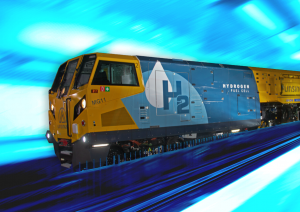 The Austrian company Linsinger takes big steps towards zero emission mobility as it has presented world’s first hydrogen rail milling machine called MG11 H2. The new vehicle, that was presented in a virtual conference in November will be available by mid – 2021.
The Austrian company Linsinger takes big steps towards zero emission mobility as it has presented world’s first hydrogen rail milling machine called MG11 H2. The new vehicle, that was presented in a virtual conference in November will be available by mid – 2021.
The new rail milling vehicle is based on the proven MG11 rail milling train concept that was developed for smallest tunnel clearances and short work windows.
“Certainly, I have asked myself if the timing is right to present this innovation right now. Nevertheless, in times of COVID – 19 crisis it is more than ever important to send a positive signal and to look ahead. My vision for 2030 is a hydrogen powered rail sector to support the goal of climate neutral mobility,” Günter Holleis, the CEO of Linsinger said.
The machine is equipped with the latest electric drive-and milling-technology which facilitated the conversion to a hydrogen powered version. The new rail milling train has the same performance capability compared to her combustion engine-powered sisters. The vehicle can work more than one full shift, including travelling to and from the work side, with one hydrogen tank load.
Due to the scalability the fuel cell technology can be used for all the milling machine types in the Linsinger portfolio. The innovative hydrogen rail milling machine is a result of a multi-year project developed by Linsinger’s Research and Development department and represents an important contribution to reduce the impact on the environment and will help countries to become climate neutral.
In a fuel cell the chemical reaction between hydrogen and oxygen results in the generation of electricity and water, and no other exhaust emissions are generated. With this innovation the already clean milling technology has become even more sustainable. The technology does not emit sparks and dust and allows by-product collection and recycling.
Linsinger has evolved from a family business to a global player. With an export quota of 98 % and 500 employees, the company is pursuing a continuous expansion strategy despite the current crisis.
Share on:



